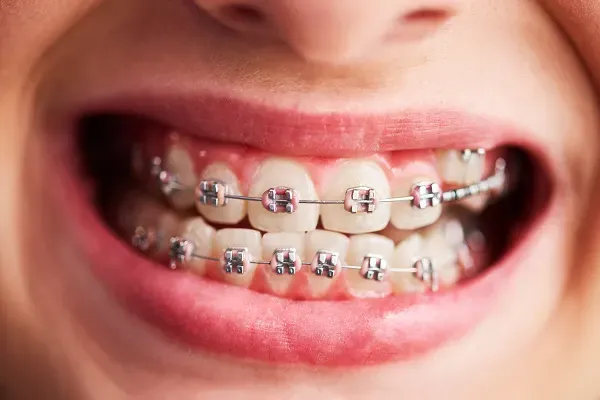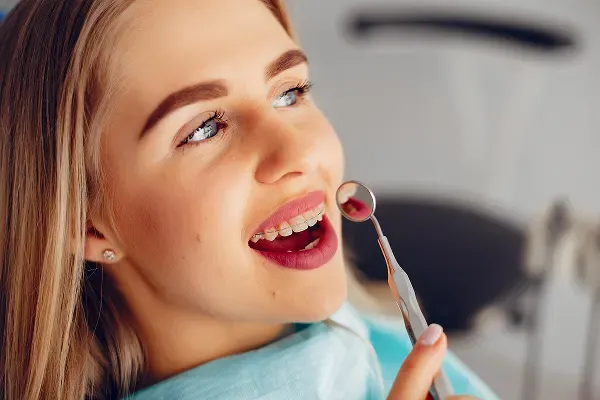Don’t Try to Fix It at Home: Let Your Orthodontist Handle Poking Wires Safely
Dr. Hoss Abar
When you're dealing with braces discomfort, it's tempting to grab a mirror, some household tools, and try to fix it yourself. But before you take matters into your own hands, there's one important message: don’t try to fix poking wire braces at home. Whether you're experiencing a sharp wire in mouth, loose wire, or mouth sores from braces, what seems like a small annoyance can quickly become a serious orthodontic emergency.
In today’s world, where viral dental hacks and DIY “braces repairs” flood social platforms, patients are increasingly tempted to self-correct. But as orthodontists often warn, improper fixes lead to greater damage, treatment delays, and painful side effects. Let’s break down the safe wire adjustment practices and why it's crucial to seek professional orthodontist wire repair instead of taking risks.

What Is a Poking Wire and Why Does It Happen?
Poking wire braces occur when the end of the archwire slips out of place or shifts after an adjustment. This can result in the wire sticking out and irritating the inside of your cheeks, lips, or gums. Routine wire tightening and adjustments often cause this issue, as even small changes can shift the wire. Sometimes, brackets may become loose or fall off entirely, making it easier for the wire to poke out. In other cases, your teeth might be shifting faster than expected, putting pressure on the wire and moving it from its original position. Accidental bumps to the mouth or biting into hard food can also knock the wire loose. While it might seem like a minor inconvenience, it’s more than just uncomfortable it’s a textbook case of a braces injury waiting to happen if not addressed properly.
DIY Orthodontic Fixes: What’s Trending (And Why They’re Risky)
Across platforms like TikTok and YouTube, creators are sharing viral tips for wire irritation using items like nail clippers, tweezers, or dental floss to "fix" braces at home. These methods include cutting the wire with scissors or clippers, attempting to bend it back into place with fingers or tools, covering the sharp end with gum or band-aids, or even trying to push the wire behind the teeth. However, each of these techniques is risky. They can lead to wire cutting danger, damage your appliance or gums, and in some cases, result in needing a full appliance replacement. What starts as a DIY fix could easily turn into an orthodontic emergency.
The Dangers of Home Wire Adjustments
Attempting to fix a poking wire at home without proper tools or sterilization can lead to injuries to your gums or cheeks, infections, or distorted wires that disrupt your treatment. It may also worsen mouth sores or cause long-term misalignment, undoing weeks of your orthodontist’s carefully planned adjustments.
Safe Steps You Can Take Before Your Appointment
While you shouldn’t attempt to perform a wire repair, there are a few orthodontist-approved things you can do to minimize pain until you get into the clinic.
Temporary relief for braces discomfort:
- Orthodontic wax: Place it over the poking end to reduce irritation
- Rinsing with warm salt water: Helps soothe mouth sores from braces
- Soft food diet: Avoid crunchy or sticky foods until the wire is fixed
- Over-the-counter braces pain relief: Ibuprofen (if allowed by your provider)
These actions offer short-term comfort but should not be mistaken for solutions. Think of them as emergency braces care—meant to get you through until a proper safe wire adjustment can be done.
Why Orthodontist-Led Repairs Are Essential
Fixing wire braces should always be left to a trained orthodontist, who can identify the exact cause of discomfort and make precise adjustments without disrupting your treatment. Unlike DIY methods, orthodontists use sterile, specialized tools designed for braces and can determine if the issue stems from a loose bracket or wire. They can replace damaged components, trim excess wire to prevent further irritation, and ensure your teeth are moving as planned. More than a quick fix, a professional repair involves a full assessment of your orthodontic progress—something only a qualified expert can provide for long-term, safe results.
Recognizing When It’s an Orthodontic Emergency
Not every poking wire calls for a same-day visit, but if you experience any of the following, it’s time to call immediately:
- The wire is cutting or puncturing your gums
- You have visible swelling or bleeding
- You cannot close your mouth comfortably
- The bracket has completely dislodged or fallen off
- The pain is affecting your eating or sleep
These symptoms are more than discomfort—they qualify as a full orthodontic emergency and should be treated accordingly.
Preventing Wire Issues: What You Can Do
While it’s impossible to eliminate every discomfort during orthodontic treatment, adopting daily preventive habits can significantly reduce the chances of experiencing a poking wire. After an adjustment, stick to soft foods to avoid stressing your braces. Brush and floss gently to prevent dislodging brackets or bending wires. Steer clear of hard, sticky, or crunchy foods like gum, popcorn, or nuts, which are common culprits behind wire issues. Make it a habit to check your braces in the mirror for signs of a loose or protruding wire. If you play sports or grind your teeth at night, wearing a mouthguard can provide added protection. These proactive measures not only reduce unexpected issues but also help keep your treatment on schedule, making your orthodontic journey more comfortable and efficient.
How Orthodontists Handle Wire Repairs Professionally
When dealing with a sharp or protruding wire, orthodontists go beyond a simple fix—they evaluate the overall condition of your braces to ensure alignment and function are maintained. Using sterilized, specialized tools, they precisely trim the wire and, if necessary, reposition or replace any loose brackets. They also adjust wire tension to support proper tooth movement and smooth the wire’s end to prevent further irritation. In cases of soft tissue inflammation, protective wax or buffering material may be applied. By relying on a professional, you avoid the risks of DIY adjustments and ensure your treatment progresses as planned—with comfort and safety prioritized.
Long-Term Pain Relief Tips for Braces Wearers
Orthodontic treatments naturally come with some sensitivity, especially after adjustments, but ongoing braces pain relief is possible through consistent care.
Try these expert-backed tips:
- Cold compresses for reducing swelling after wire adjustments
- Orthodontic mouth rinses to heal minor ulcers or sores
- Hydration and oral hygiene to prevent friction and dryness
- Avoid chewing on pens, nails, or ice, which can knock wires loose
By being gentle and mindful, you can greatly reduce your chance of a dental wire sticking out and avoid developing mouth sores from braces.

Why Fixing Braces at Home Can Backfire
While at-home fixes may seem like a quick solution, they often do more harm than good. Attempting to repair braces yourself can disrupt your treatment timeline, cause internal injuries or infections, and even damage the appliance—resulting in costly replacements. These DIY efforts can also lead to extended wear time due to compromised progress. Ultimately, emergency braces care should always be entrusted to professionals who understand your treatment plan, ensuring safe, effective adjustments that keep your orthodontic journey on track.
Final Thoughts
When facing any braces injury or wire irritation, resist the urge to reach for a tool or copy a social media hack. What seems like a small issue—a poking wire or loose wire—can disrupt your entire orthodontic treatment if handled incorrectly.
Remember, safe wire adjustment comes from training, not trial and error. If something feels off, call your orthodontist right away and get the care your smile deserves. Trust the process, avoid shortcuts, and let the experts handle what they do best—guiding your teeth safely into place.
Contact your Pinole dentist, Dr. Hoss Abar, DDS, MSD at Abar Orthodontics, to learn more about Don’t Try to Fix It at Home and Let Your Orthodontist Handle Poking Wires Safely.
Resource:
Life with Braces vs. Invisalign: What to Expect Day-to-Day
*This media/content or any other on this website does not prescribe, recommend, or prevent any treatment or procedure. Therefore, we highly suggest that you get the advice of a qualified dentist or other medical practitioners regarding your specific dental condition.*
More To Explore
About Us
We believe that every patient deserves to feel confident about their smile. Years of experience creating beautiful and flawless smiles.
Opening Hours:
Monday - Thursday: 8:00 AM - 5:00 PM
Friday: 8:00 AM - 12:00 PM
Saturday - Sunday: Closed
Abar Orthodontics, Pinole, CA
1500 Tara Hills Drive., Suite 204
Pinole, CA 94564
Abar Orthodontics, San Leandro, CA
145 East 14th street., #100
San Leandro, CA 94577
© 2026Abar Orthodontics | All rights reserved | Powered by:Vigorant, Inc.
